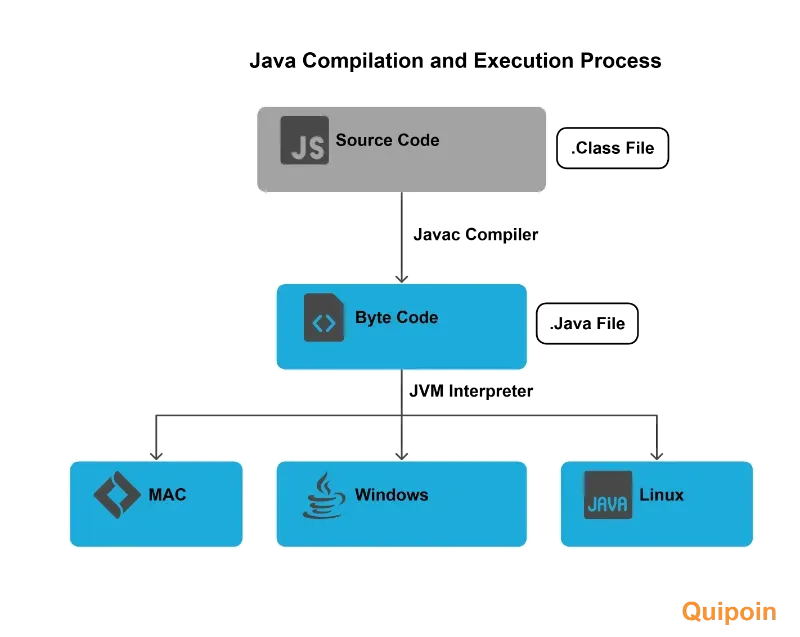Java Features
Java is everywhere from mobile apps and web applications to enterprise software and banking systems. Its versatility, reliability, and ease of use make it one of the most popular programming languages in the world.
- Beginner-friendly syntax, similar to C++ but without the complexity.
- Avoids confusing features like operator overloading and multiple inheritance.
- Designed for secure and efficient application development.
2. Platform Independent
- “Write Once, Run Anywhere” — Java code runs on any device with a Java Virtual Machine (JVM).
- No need for OS-specific changes.
3. Compiled & Interpreted
- Java code is compiled into platform-independent bytecode.
- The JVM interprets and runs bytecode on any supported system.
- Offers optimized performance and fast execution.
4. Portable & Architectural Neutral
- Bytecode is not tied to any hardware or OS.
- The JVM abstracts hardware details, ensuring consistent execution across platforms.
5. Object-Oriented
- Models real-world entities using classes and objects.
- Supports encapsulation, inheritance, polymorphism, and abstraction for better code organization and reuse.
6. Robust & Secure
- Automatic memory management with garbage collection.
- Exception handling prevents system crashes.
- No pointers, reducing memory errors.
- Strong security model with bytecode verification, cryptographic APIs, and sandboxing.
7. Distributed & Multithreaded
- Built-in libraries for networking and distributed computing.
- Supports multithreading, allowing multiple tasks to run simultaneously.
- Thread synchronization ensures safe interactions.
8. High Performance & Dynamic
- Just-In-Time (JIT) compiler and HotSpot optimizations for speed.
- Supports dynamic class loading and runtime extension.
How It Works:
1. Source Code Compilation:
- Write Java code in .java files.
- The javac compiler converts it into bytecode (.class files).
2. Java Bytecode:
- Bytecode is not hardware-dependent.
- Executed by the JVM, not directly by the OS.
3. Java Virtual Machine (JVM):
- Each OS has its own JVM implementation.
- JVM reads bytecode and translates it for the native system.
- This enables true cross-platform compatibility.

OOP is a programming style that organizes software around objects instances of classes that bundle data and behavior.
Four Key Principles of OOP
Binding the data (variables) and code (methods) together inside a class, and hiding the internal details from the outside.
Real-Life Example: A bank ATM lets you withdraw or deposit money, but you don’t know what happens inside the working is hidden.
Why it matters?
Protects data from being changed accidentally.
Only allows safe interactions through methods (getters/setters)
A new class (child) can inherit properties and methods from an existing class (parent), saving time and effort.
Real-Life Example: A child inherits traits from parents like eye color or height.
Why it matters?
Reuses existing code.
Helps build a hierarchy of classes.
Supports method overriding (changing behavior).
3. Polymorphism:
Real-Life Example: The word "run" means something different for a cricketer, a software, and a politician.
Why it matters?
Same method can perform different actions.
Makes programs flexible and easier to update.
Real-Life Example: You use your phone to call, but don’t need to know how the signal is transmitted.
Why it matters?
Makes code simpler and cleaner.
Protects sensitive or complex logic.
Useful when working with large systems.
Java fully embraces these OOP principles, making your code modular, maintainable, and scalable.
| Feature | Procedural | Functional | Object Oriented |
|---|---|---|---|
| Execution | Sequential | Function based | Object based |
| Data Handling | Separate | Immutable | Encapsulated in objects |
| Functions | Procedures | Pure, no side effects | Methods within objects |
| Examples | C, Pascal, BASIC | Haskell, Lisp, Scala | Java, C++, Python |
- Procedural: Step-by-step instructions and routines.
- Functional: Pure functions and immutability.
- Object-Oriented: Code organized around objects and their interactions.
Java blends all three, making it adaptable for a variety of projects.
- Java Highlights Platform-Independent: Write once, run anywhere with JVM.
- Object-Oriented: Focuses on real-world objects and relationships.
- Automatic Memory Management: Garbage collection prevents memory leaks.
- Rich API: Extensive libraries for everything from data structures to networking.
- Multithreading: Efficient concurrent programming.
- Security: Features like bytecode verification and Security Manager.
Need more clarification?
Drop us an email at career@quipoinfotech.com
